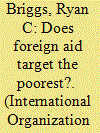| Srl | Item |
| 1 |
ID:
152332


|
|
|
|
|
| Summary/Abstract |
To examine the extent to which foreign aid reaches people at different levels of wealth in Africa, I use household surveys to measure the subnational distribution of a country's population by wealth quintiles and match this information to data on the location of aid projects from two multilateral donors. Within countries, aid disproportionately flows to regions with more of the richest people. Aid does not favor regions with more of the poorest people. These findings violate the stated preferences of the multilateral donors under study, suggesting that the donors either cannot or are not willing to exercise control over the location of aid projects within countries. The results also suggest that aid is not being allocated effectively to alleviate extreme poverty.
|
|
|
|
|
|
|
|
|
|
|
|
|
|
|
|
| 2 |
ID:
120909


|
|
|
|
|
| Publication |
2013.
|
| Summary/Abstract |
In 1999, the year before Ghana's 2000 election, the country experienced a large, unexpected decline in aid. The incumbent National Democratic Congress (NDC) lost the election. Did the decline in aid hurt the NDC at the polls, or was it simply incidental? Using data from a national, World Bank-funded electrification project, this article shows that the NDC was able to allocate aid according to explicitly political criteria. The article also exploits a quasi-experiment in aid disbursements to show that electrification caused NDC voting to increase in the constituencies that received electrification. Pre-electoral aid fluctuations exert a modest but measurable force on voting patterns. These findings add weight to calls for donors to coordinate to reduce aid volatility. They also show that incumbent governments can allocate aid strategically to secure votes, even under the best-case scenario of strict donor monitoring in an established democracy.
|
|
|
|
|
|
|
|
|
|
|
|
|
|
|
|
| 3 |
ID:
147231


|
|
|
|
|
| Summary/Abstract |
While the percentage of women publishing in African Affairs and The Journal of Modern African Studies from 1993 until 2013 has increased, the percentage of articles by Africa-based authors has declined. We present evidence suggesting that this decline is not being driven by lower submission rates from Africa but rather by low and declining acceptance rates. We also find that Africa-based scholars, but not women, are systematically cited less than others. We then analyse article titles and find preliminary evidence suggesting that Africa-based authors are more likely to write on a small number of countries and less likely to generalize. Authors based outside Africa seem more likely to generalize to the continent and are more likely to write on economics or conflict. These patterns have implications for the diversity of the discipline and the state of our knowledge about Africa.
|
|
|
|
|
|
|
|
|
|
|
|
|
|
|
|